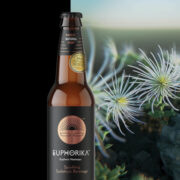5 Reasons to Drink Wine in a Can

Most easy-drinking wines we find on supermarket shelves are meant to be drunk shortly after being bottled, while they’re at the peak of flavour and aroma. These days these types of wines are commonly referred to as ‘table wines’ and are meant to be consumed within a year or two of buying, at most. Because table wines don’t necessarily get better with age, they can be packaged in a number of ways — in a glass or plastic bottle with a screw cap, a box, or even in a can.
Canned wine is taking the global table wine market by storm. While there will always be a place for fancy, special occasion wine in a bottle, the easy-drinking, table wine we often enjoy at braais, dinner parties, picnics, and outdoors is the type of wine most South Africans engage with on a regular basis. So why not enjoy it a more modern and convenient way? If you have never tried wine in a can before, now is the perfect time to open your mind to the future of wine – here’s why:

It’s a more sustainable option
Storing wine in specially-lined aluminium cans has numerous benefits to ease the mind of the more conscious consumer. A can has a smaller carbon footprint than a glass bottle because it’s made from approximately 68% recycled material, is lighter in weight and therefore burns less fuel to transport, and uses no paper or water for labelling. The material from a beverage can that’s responsibly recycled can end up on a shelf again within two months. More wine for everybody!
It’s lightweight and convenient
For adventurous wine drinkers who love to socialise, travel and soak up the outdoors, a can is more lightweight to carry than glass,. It also doesn’t require you to have an opener or a drinking glass, and the serving size is perfect for one, so there’s no need to lug home a half a warm bottle of red, white or rosé.

It’s more mindful
The ‘mindful drinking’ or ‘sober curious’ movement, in which social drinkers choose to cut down their alcohol intake, is growing – especially amongst younger consumers. This means having just one glass is becoming much more trendy. Most canned wine options come in 250ml sizes and the measured portion size helps to keep tally more easily. Instead of guessing how much wine you’re pouring with that heavy hand of yours, these little cans can help you keep track.
It offers value for money
We could all do with saving a rand or two on essentials like wine. If you’re counting your pennies at the end of the month, cans allow you to budget carefully per serving, and some options cost as little as R16 a can.

It’s ready to enjoy right now
Cans are just one example of the exciting revolution in the wine industry to be more accessible to growing numbers of forward-thinking newcomers to the scene. There’s no need to age a can in a cellar, worry about corking the wine, let it breathe after opening, or serve it in a specially shaped glass. You can open a can and sip your wine straight away, and it’ll taste great every time.
Canned wine options in South Africa
Dying to try wine in a can? Here are a few South African canned wine options to try:
Perdeberg SSR:
Perdeberg Wines has launched a 250ml format of its popular easy-drinking and fruit-driven Soft Smooth Range (SSR) in a unique, attention-grabbing zebra-print can. Buy a single can or a six-pack of Perdeberg SSR at your local OK Foods or Spar and pair it with a delicious pizza, a mild curry or hearty winter stew. Read our full review here.
Uncanny:
Hitting the market 4 months ago, Uncanny’s cans of premium red and white wines were the first to be certified by South Africa’s Wine and Spirit Board. Available in Pick n Pay stores countrywide, the range offers both a Chenin Blanc and Merlot varietal. Find out more about this local start-up here.
J.C. Le Roux cans:
These newly launched canned wines bring the magic if bubbly to cans. The range launched with two flavours; J.C. Le Roux Apple Blossom & Zesty Citrus and La Fleurette Light in 250ml cans. These canned sparkling wines are perfect for a pop of spontaneity when opening a whole bottle of sparkling wine isn’t exactly necessary.











